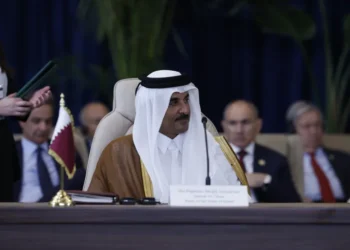Japan’s governing coalition has lost its upper house majority following elections that saw major gains for a right-wing populist party.
Japanese Prime Minister, Shigeru Ishiba’s coalition won 47 seats in the 248-seat House of Councillors in Sunday’s election, three short of the 50 it needed to retain control of the upper chamber.
The outcome left Ishiba’s Liberal Democratic Party (LDP) and junior partner Komeito with a combined 122 deputies in the upper chamber, which fills half of its seats in elections every three years.
The centre-left main opposition Constitutional Democratic party now has a total of 37 seats, with the centre-right Democratic Party for the People now on 22.
The result marks another serious blow for Ishiba, whose government is locked in high-stakes trade negotiations with United States President Donald Trump’s administration, after his coalition lost control of the more powerful National Diet, the lower house, in elections in October.
Turnout was 58%, six points higher than the last upper house vote, with a record number of people casting ballots in advance, in part due to the election falling in the middle of a three-day weekend.
Amid widespread discontent over rising living costs, the previously fringe Sanseito party broke into the political mainstream, picking up 14 seats on top of its one existing seat.
The party, which only holds three seats in the National Diet, capitalised on voter frustration over inflation and Japan’s moribund economy with warnings about immigration and populist pledges on tax cuts and social welfare.
Sanseito leader Sohei Kamiya, a 47-year-old former English teacher and supermarket manager, has stirred controversy with conspiracy theories about vaccines and “globalist elites”, and cited Trump’s “bold political style” as inspiration.

In an interview with Nippon Television after the vote, Kamiya defended his “Japanese First” slogan.
“The phrase was meant to express rebuilding Japanese people’s livelihoods by resisting globalism. I am not saying we should completely ban foreigners or that every foreigner should get out of Japan.”
Sohei Kamiya,
Despite denying accusations of xenophobia, Sanseito built its platform on nationalist appeals and fears of a “silent invasion” by immigrants.
Political Analyst say that the party’s message resonates with many Japanese voters facing a stagnant economy and a weakening yen, which have drawn record numbers of tourists and fuelled inflation.
While Sanseito has drawn comparisons with far-right European groups such as Germany’s AfD and Reform UK, right-wing populism is a relatively new phenomenon in Japan, where such movements have historically struggled to gain traction.
According to David Boling, a Director at the consulting firm Eurasia Group, “The LDP was largely playing defence in this election, being on the wrong side of a key voter issue.”
“Polls show that most households want a cut to the consumption tax to address inflation, something that the LDP opposes. Opposition parties seized on it and hammered that message home.”
David Boling
Japan’s Prime Minister Vows To Stay On
Japanese Prime Minister, Shigeru Ishiba’s has vowed to stay on despite his coalition losing its upper house majority in elections that saw strong gains by a rightwing populist party.
Speaking earlier, Ishiba, 68, said that he “solemnly” accepted the “harsh result.” He added, “It’s a difficult situation, and we have to take it very humbly and seriously.”
While the ballot does not directly determine whether Ishiba’s minority government falls, it heaps pressure on the embattled leader, who also lost control of the more powerful lower house in October and who has never been popular within his own party.
Ishiba told a news conference he would remain in office to oversee tariff talks with the United States and other pressing matters such as rising consumer prices that are straining the world’s fourth largest economy.
“We are engaged in extremely critical tariff negotiations with the United States … we must never ruin these negotiations. It is only natural to devote our complete dedication and energy to realising our national interests.”
Shigeru Ishiba
Japan faces a deadline of August 1, 2025, to strike a trade deal with the US.
READ ALSO: Ghana Police Charged to Ensure Incident-Free Akwatia By-Election





















